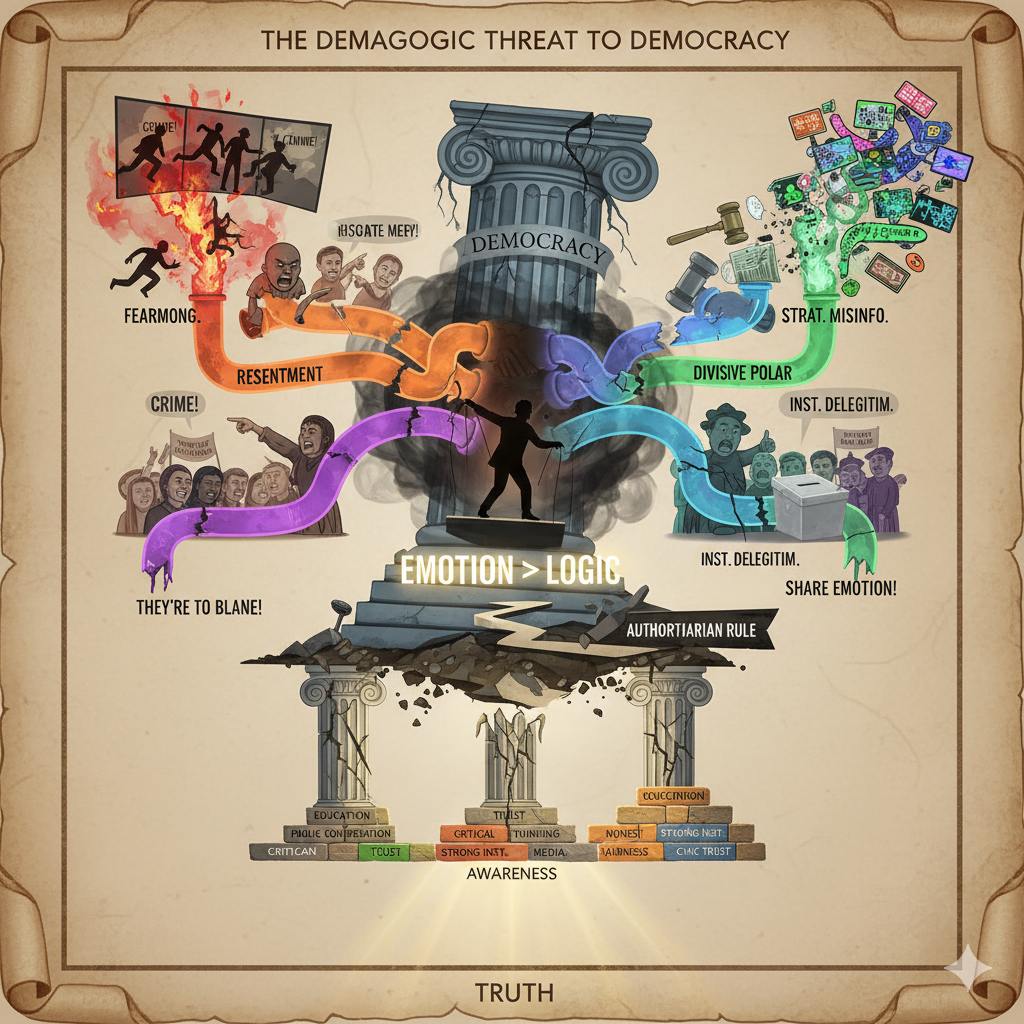Demagogic Threat to Democracy
"Witness the step-by-step unraveling of democracy under demagogic assault. From inciting fear to authoritarianism and the critical role education has in defense."

The Demagogic Threat to Democracy (Simplified Version)
Overview
This paper explains how certain political leaders—called demagogues—use emotional tricks to gain power and weaken democracy.
They use five main tools:
- Fearmongering – spreading fear to control people.
- Resentment cultivation – turning frustration into anger toward others.
- Divisive polarization – splitting people into “us vs. them.”
- Institutional delegitimization – making people stop trusting important systems like courts or the press.
- Strategic misinformation – spreading lies to confuse and divide.
These tools make people emotional, less logical, and easier to manipulate. When enough citizens fall for these tricks, democracy breaks down and becomes vulnerable to authoritarian rule.
1. Fearmongering – Ruling Through Fear
Demagogues use fear to make people panic.
They exaggerate dangers—like crime, immigration, or foreign threats—and claim only they can fix things.
Fear shuts down critical thinking, making people more likely to accept extreme actions or give up freedoms “for safety.”
In short: when people are scared, they stop asking questions.
2. Resentment Cultivation – Turning Anger Into a Weapon
Resentment means long-lasting anger about feeling treated unfairly.
Demagogues feed this anger by blaming specific groups—immigrants, minorities, or political rivals—for people’s problems.
They say, “You’re suffering because of them.”
This simple story feels satisfying but hides real causes like technology, economics, or poor policy.
Resentment keeps people angry and united behind the demagogue.
3. Divisive Polarization – Splitting the Public
Healthy democracies depend on citizens respecting each other even when they disagree.
Demagogues destroy this by dividing society into “real patriots” and “enemies.”
They say compromise is weakness and disagreement is betrayal.
This turns normal debates into battles for survival.
When people stop seeing opponents as fellow citizens, democracy stops working.
4. Institutional Delegitimization – Breaking Trust in Systems
Demagogues attack the systems that keep leaders accountable—like courts, journalists, and election officials.
They claim these institutions are “corrupt,” “rigged,” or “controlled by enemies.”
Once people stop trusting these systems, facts no longer matter.
Without trusted referees, lies and abuse of power go unchecked.
5. Strategic Misinformation – Destroying Shared Truth
Misinformation means spreading false or misleading stories.
Demagogues flood the public with so many lies that people give up trying to tell what’s real.
Social media makes this worse by promoting emotional content over truth.
When truth disappears, people rely only on tribe or emotion—exactly what the demagogue wants.
Why These Tools Work
Human brains are wired for emotion and survival, not for sorting complex information.
We believe stories that make us feel something—especially fear or anger.
We also trust people who sound confident and think like us.
Demagogues know this. They use repetition, identity, and emotion to bypass logic and reason.
The Damage to Democracy
When fear, anger, and lies take over, three things collapse:
- Public conversation – people shout instead of discuss.
- Trust – no one believes in fair rules or facts.
- Institutions – courts, elections, and news lose authority.
This opens the door for authoritarian leaders who promise “order” at the cost of freedom.
Protecting Democracy
The best defense is education and awareness:
- Teach critical thinking – help citizens recognize manipulation.
- Support honest media – value fact-checking over outrage.
- Strengthen institutions – keep courts, elections, and the press independent.
- Encourage fairness – treat opponents as equals, not enemies.
- Promote civic trust – remind people democracy works only when we all play by the rules.
Conclusion
Demagoguery is not new—it has existed since ancient times—but today’s technology makes it far more powerful.
Democracy will always face this threat because it depends on open debate and freedom of speech.
Our defense lies in staying informed, calm, and connected to truth.
Every generation must choose whether to give in to fear and division—or stand together for reason, fairness, and shared humanity.
